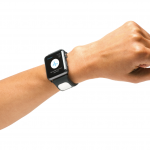 AliveCor disclosed its latest FDA 510(k) clearance for the KardiaMobile 6L, for calculation of patients’ QTc interval by the patient remotely or in the office with a physician or other clinician. QTc interval is, for those of us who aren’t cardiologists, is the total time from ventricular depolarization to complete repolarization. If too long (prolongation) or too short (congenital short) for the heart rate, it can indicate a dangerous ventricular arrhythmia or atrial or ventricular fibrillation. The manual measurement takes 30 seconds. AliveCor also has clearance on software (InstantQT) that measures QT intervals quickly and accurately to detect potentially dangerous QT prolongations in patients. Prolongations can be triggered by medications including anti-arrythmia drugs, anti-fungals, antibiotics, and some psychiatric drugs. AliveCor release. In other recent news, in June they acquired CardioLabs, a monitoring and cardiac diagnostic service provider based in Tennessee, to expand their clinical servies. Release.
AliveCor disclosed its latest FDA 510(k) clearance for the KardiaMobile 6L, for calculation of patients’ QTc interval by the patient remotely or in the office with a physician or other clinician. QTc interval is, for those of us who aren’t cardiologists, is the total time from ventricular depolarization to complete repolarization. If too long (prolongation) or too short (congenital short) for the heart rate, it can indicate a dangerous ventricular arrhythmia or atrial or ventricular fibrillation. The manual measurement takes 30 seconds. AliveCor also has clearance on software (InstantQT) that measures QT intervals quickly and accurately to detect potentially dangerous QT prolongations in patients. Prolongations can be triggered by medications including anti-arrythmia drugs, anti-fungals, antibiotics, and some psychiatric drugs. AliveCor release. In other recent news, in June they acquired CardioLabs, a monitoring and cardiac diagnostic service provider based in Tennessee, to expand their clinical servies. Release.
And in David Sues Goliath–Again–News, AliveCor also filed, in that quiet week right before Memorial Day, a Federal antitrust suit in the Northern District of California. This lawsuit is over Apple’s exclusion of other heartrate analysis providers from the Apple Watch, harming AliveCor and consumers, and seeks damages plus an injunction to cease the exclusion. Release This is in addition to their US International Trade Commission (ITC) complaint on infringement of AliveCor patents held for heart monitoring on the Apple Watch 4, 5, and 6. That seeks to bar importation of Apple Watches [TTA 29 Apr]. No update on that so far.
‘Insider’ report: VRI on the market. PERS Insider, our newly discovered source for news about the emergency response device market, reported on 22 June that VRI, a PERS and remote patient monitoring provider, is up for sale. It has been majority-owned by Pamlico Capital, a private equity company, since 2014. VRI does not sell direct to consumer but concentrates on health insurance, government programs, and other B2B through its dealer network. No reasons for sale given, but with all things telehealth and most things remote healthtech fetching hefty sums post-pandemic, perhaps Pamlico senses a fortuitous time to test the waters for an exit. Article. (Subscribe here to their weekly free letter)
Walgreens Boots Alliance’s new CEO promises a ‘tech-enabled’ future for the chain, sans details. The incoming CEO, Rosalind Brewer, fresh from her COO position at Starbucks, on WBA’s Q3 earnings call mentioned a buildout of a “previously communicated tech-enabled healthcare initiative” but no further information, as still reviewing the company. Stefano Pessina has retired from the long-held CEO position, but retains the executive chair title in addition to being WBA’s largest individual shareholder. Forbes’ breathless report. More to the profit point, the latest on Walgreens and VillageMD’s full-service Village Medical practices at Walgreens locations: 29 new locations in Houston, Austin and El Paso, Texas this year, staying on track for 600 primary care practices in more than 30 markets over next four years. Business Wire
National telehealth usage dips to 4.9% of US claims in April, a 12.5% drop from March. Analyzing regional and national insurance claims data, non-profit health analytics company FAIR Health in its monthly report tracks telehealth receding as patients return to in-person care. Telehealth is now dominated by mental health procedure codes, accounting for 58.65% of diagnoses, with all other conditions at 3% or lower. Regionally, the Northeast is even higher at 64.2% and the Midwest above 69%. Monthly National report, Monthly Regional Tracker page



 Comings and Goings: There may be some end of year bombshells, but after last week’s big news about John Halamka, it’s been fairly quiet. Paul Walker, whom this Editor knew at New York eHealth Collaborative, has joined CommonWell Health Alliance as executive director. Mr. Walker was most recently Philips Interoperability Solutions’ vice president of strategy and business development. CommonWell’s goal is improving healthcare interoperability and its services are used by more than 15,000 care provider sites nationwide.
Comings and Goings: There may be some end of year bombshells, but after last week’s big news about John Halamka, it’s been fairly quiet. Paul Walker, whom this Editor knew at New York eHealth Collaborative, has joined CommonWell Health Alliance as executive director. Mr. Walker was most recently Philips Interoperability Solutions’ vice president of strategy and business development. CommonWell’s goal is improving healthcare interoperability and its services are used by more than 15,000 care provider sites nationwide. 





Most Recent Comments